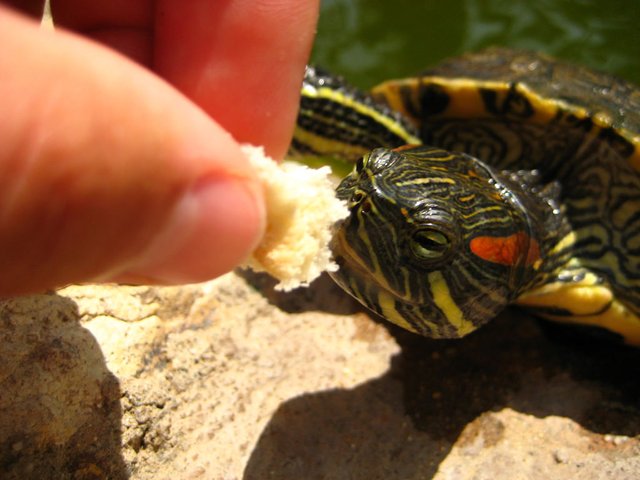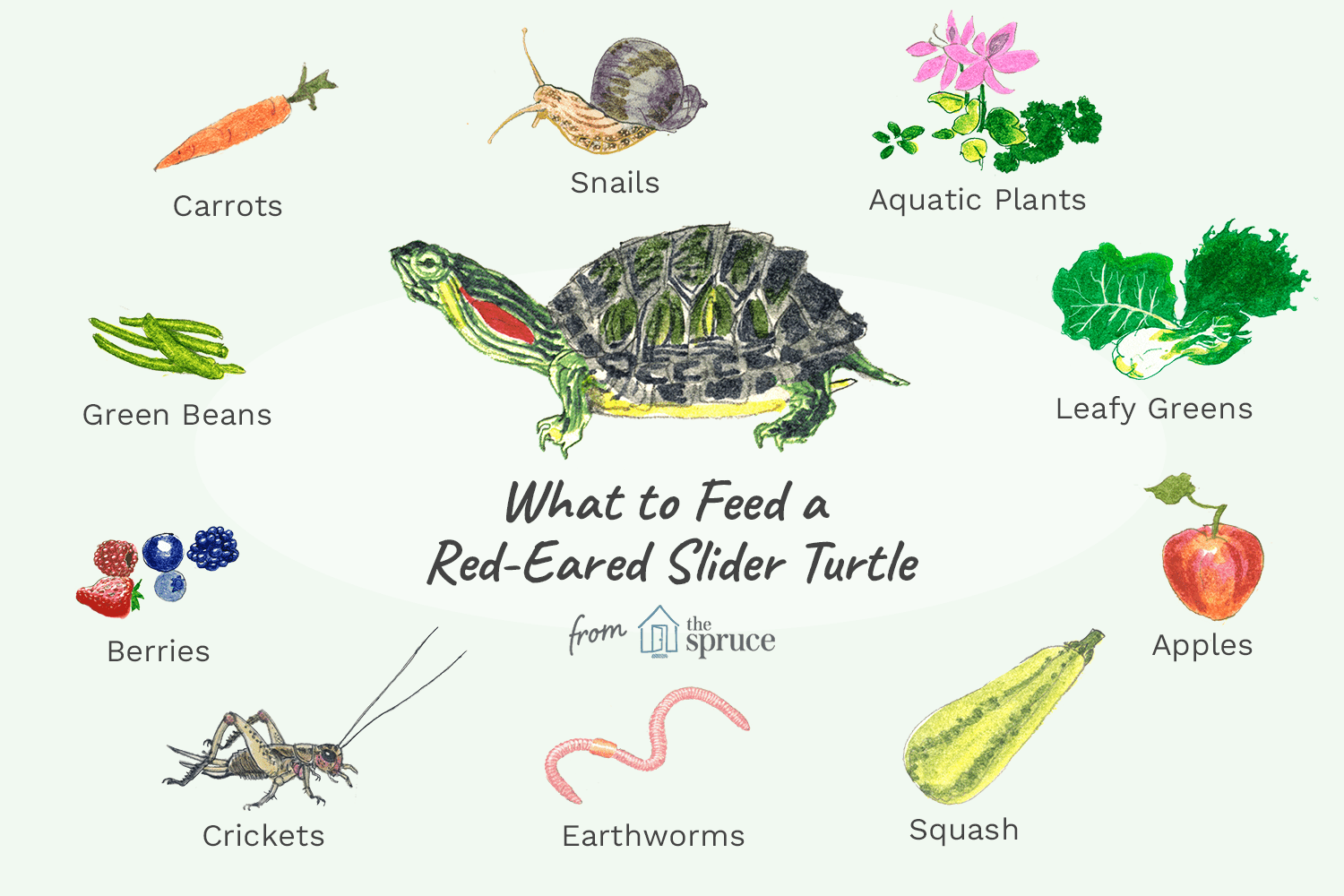Turtles can eat fruits, vegetables, and small amounts of lean protein from human food. Providing a balanced diet is crucial for their health and well-being.
When considering feeding turtles human food, it’s important to ensure that it is safe, free from additives, and given in moderation. While turtles can enjoy certain foods like leafy greens, berries, and even small pieces of cooked fish, it’s essential to avoid feeding them high-fat, sugary, or processed foods that can be harmful to their digestive system.
By understanding the dietary needs of turtles and offering a variety of nutritious options, you can help them thrive and lead a healthy life.
Nutritional Needs Of Turtles
When it comes to the nutritional needs of turtles, it’s important to understand their dietary requirements to ensure they remain healthy and thrive. Turtles have specific nutritional needs that must be met to support their growth, development, and overall well-being.
Understanding The Dietary Requirements Of Turtles
Turtles require a balanced diet that includes a variety of nutrients to support their health. Understanding their dietary requirements is essential in providing them with the proper nutrition they need to thrive. This includes a combination of protein, vitamins, minerals, and fiber to support their overall well-being.
When it comes to the nutritional needs of turtles, it’s essential to provide them with a well-rounded diet that meets their specific requirements. This includes a combination of plant matter, insects, and small fish to ensure they receive the necessary nutrients to support their growth and development. It’s important to offer a variety of foods to ensure they receive all the essential nutrients they need.

Credit: steemit.com
Safe Human Foods For Turtles
When it comes to feeding your pet turtle, it’s essential to know what safe human foods they can enjoy. By incorporating a variety of turtle-friendly human foods into their diet, you can ensure they receive the necessary nutrients for their well-being.
Identifying Turtle-friendly Human Foods
- Choose fresh, organic options to avoid pesticides and additives.
- Ensure the foods are chopped into small, bite-sized pieces for easy consumption.
Vegetables And Fruits
- Leafy greens: Spinach, kale, and lettuce are rich in vitamins and minerals.
- Squash and pumpkin: Provide essential nutrients and hydration for turtles.
- Berries: Strawberries, blueberries, and raspberries are great sources of antioxidants.
Proteins And Calcium Sources
- Cooked meats: Lean proteins like chicken and turkey can be offered in moderation.
- Fish: Turtles can enjoy small amounts of cooked fish for protein intake.
- Calcium: Offer calcium-rich foods like cuttlebone or crushed eggshells for shell health.
Foods To Avoid
When it comes to feeding turtles, it’s essential to be mindful of the foods to avoid. While turtles can consume a variety of human foods, there are specific items that can be harmful to their health. Highlighting foods harmful to turtles is crucial for ensuring the well-being of these fascinating reptiles.
Highlighting Foods Harmful To Turtles
It’s important to be aware of the foods that can pose a risk to turtles, as consuming these items can lead to health issues and even be fatal for the turtles. Here are some foods that should be avoided when feeding turtles:
- Processed Foods: Foods high in preservatives, artificial flavors, and additives can be harmful to turtles’ digestive systems.
- Dairy Products: Turtles lack the enzymes necessary to digest dairy, making it difficult for them to process and leading to digestive problems.
- Salty Foods: Excessive salt intake can disrupt the electrolyte balance in turtles, leading to dehydration and other health issues.
- Sugary Treats: Foods high in sugar can lead to obesity and dental problems in turtles, impacting their overall health.
- High-Protein Foods: While turtles require protein, an excessive amount from human food sources can lead to kidney and liver damage.
- Human Snack Foods: Snacks like chips, crackers, and cookies are high in unhealthy fats and additives, posing a risk to turtles’ well-being.

Credit: www.quora.com
Feeding Guidelines
Turtles can eat a variety of human food, including leafy greens, vegetables, and small amounts of fruits. However, it’s important to avoid feeding them dairy products, processed foods, and high-sodium or sugary snacks. Stick to natural and nutritious options to keep your turtle healthy and happy.
Best Practices For Feeding Turtles
Feeding turtles with human food can be a great way to add variety to their diet. However, it’s essential to remember that not all human food is safe for turtles to eat. It’s crucial to follow some guidelines while feeding turtles with human food.Stick to a Balanced Diet
Turtles need a balanced diet that includes a mix of protein, vegetables, and fruits. Ensure that the food you are feeding your turtle is providing them with all the essential nutrients they need to stay healthy.Feed in Moderation
Turtles have a slow metabolism, and overfeeding can lead to health problems such as obesity and shell deformities. Feed your turtle small portions of human food and keep track of how much they are eating.Avoid Harmful Foods
Not all human food is safe for turtles. Some foods can be toxic and cause health problems. Avoid feeding your turtle processed foods, sugary foods, dairy products, and anything high in salt.Prepare Food Properly
Before feeding your turtle human food, make sure it’s prepared correctly. Avoid seasoning or adding spices to the food as it can be harmful to turtles.Consult a Vet
If you’re unsure about what human food is safe for your turtle to eat, consult a vet. They can provide you with expert advice on what human food to feed your turtle and in what quantity.Conclusion
Feeding turtles with human food can be a great way to add variety to their diet, but it’s crucial to follow some guidelines. Stick to a balanced diet, feed in moderation, avoid harmful foods, prepare food correctly, and consult a vet if unsure. By following these guidelines, you can ensure that your turtle remains healthy and happy.Balanced Diet For Turtles
Just like humans, turtles need a balanced diet to maintain their health and well-being. While commercial turtle food is a great option, you can also supplement your turtle’s diet with human food. However, it’s important to ensure that the food is safe and nutritious for your shelled friend.
Creating A Nutritious Meal Plan For Turtles
When creating a meal plan for your turtle, it’s important to ensure that the diet is balanced and includes a variety of foods. The following are some human foods that are safe and healthy for turtles:
| Food | Benefits |
|---|---|
| Leafy Greens (such as kale, collard greens, and dandelion greens) | Rich in vitamins and minerals |
| Carrots | High in vitamin A |
| Tomatoes | High in vitamin C |
| Strawberries | High in vitamin C and antioxidants |
| Apples | High in fiber |
| Green Beans | High in fiber and protein |
It’s important to remember that turtles are omnivores and require both plant and animal-based foods in their diet. Some safe options include cooked chicken, fish, and insects.
Conclusion
By creating a balanced meal plan for your turtle that includes both commercial turtle food and human food, you can ensure that your shelled friend is getting all the necessary nutrients for a healthy and happy life.
Supplements For Turtles
Discover the best supplements for turtles to enhance their diet with human food options. Turtles can safely enjoy veggies, fruits, and proteins like fish and insects, providing a balanced and nutritious meal plan. Ensure proper portion control and variety to support their health and well-being.
Understanding The Role Of Supplements In Turtle Diets
Turtles, like any other living creature, need a balanced diet to thrive. While their primary diet consists of vegetables, fruits, and commercial turtle food, supplements play a crucial role in ensuring they receive all the essential nutrients. Understanding the significance of supplements in a turtle’s diet is vital for their overall health and well-being.
The Importance Of Calcium And Vitamin D3 For Turtles
Calcium and vitamin D3 are essential for maintaining a turtle’s bone health and preventing metabolic bone disease. Turtles require a proper balance of these nutrients to support their shell and skeletal development. Inadequate calcium and vitamin D3 levels can lead to serious health issues, making it crucial to provide these supplements as part of their diet.
Consulting A Vet
Consulting a vet is crucial for ensuring the well-being of your turtle. Professional guidance is essential.
Importance Of Professional Advice For Turtle Nutrition
Experts can provide tailored recommendations based on your turtle’s specific needs.
Consulting A Vet For Turtle Health
Veterinarians possess the knowledge to address any dietary concerns or health issues.

Credit: steemit.com
Conclusion
Human food can be a treat for turtles, but it’s essential to provide them with a balanced diet. Feeding them the right foods in moderation is key to their health and well-being. Remember to consult with a veterinarian to ensure you are meeting your turtle’s dietary needs.
With careful consideration, you can enjoy sharing some human foods with your shelled friend while keeping them healthy and happy.






Leave a Reply